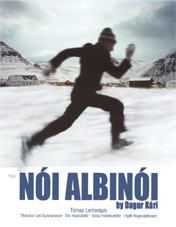Nói Albinói
aka Noi, or Noi the Albino |
| |
 |
Icelandic language. Iceland/Germany/UK/Denmark, 2003. Not rated. 80 minutes.
Cast:
Tómas Lemarquis, Thröstur Leo Gunnarsson, Elin Hansdóttir, Anna Fridriksdóttir, Hjalti Rögnvaldsson, Pétur Einarsson, Kjartan Bjargmundsson, Greipur Gíslason
Writer: Dagur Kári
Original Music: Orri Jonsson, Dagur Kári
Cinematography: Rasmus Videbæk
Producers: Philippe Bober, Kim Magnusson, Skúli Fr. Malmquist, Thórir Snær Sigurjónsson
Director: Dagur Kári
LINKS
|
[Read the AboutFilm interview with star Tómas Lemarquis and director Dagur Kári]
 celand is as close to the edge of the world as you can get while technically remaining in Europe. Less than three hundred thousand people, most of them of Scandinavian descent, inhabit this island lost in the North Atlantic. To outsiders, there appears to be little more to Iceland than volcanoes, cod fishing, and Bjork.
celand is as close to the edge of the world as you can get while technically remaining in Europe. Less than three hundred thousand people, most of them of Scandinavian descent, inhabit this island lost in the North Atlantic. To outsiders, there appears to be little more to Iceland than volcanoes, cod fishing, and Bjork.
To Nói (Tómas Lemarquis), a seventeen year old albino, there is even less than that. He doesn't fish, and trippy electronic alt-rock isn't part of the scene in tiny Bolungarvík, population 957, a remote town huddled in the western Fjords, buried by snow. Time means little in Bolungarvík, where pop culture relics like View Masters and Rubick's Cubes are still lying around, and the future holds no promise of anything different from the past. Nói's grandmother whiles away the hours with jigsaw puzzles. Nói's father drinks and drives a cab that never picks up any fares. Everyone has a routine.
Nói's routine is to skip school and go have a malt at the gas station-slash-coffee shop instead. He might then visit the bookstore or spend time in his secret hideaway, a tiny cellar under his grandmother's house. Though school doesn't interest him, Nói is a bright kid. We can tell by how he rigs the slot machine to dispense money at the coffee shop and how quickly he solves a Rubick's Cube. Cleverness means little here, though, and being an albino, Nói looks as different as he feels. While his school tries to figure out what to do with him, Nói just drifts along.

Tómas Lemarquis is Noi the Albino. |
Into Nói's monotonous life enters a new girl from Reykjavik, Iris. Nói is instantly smitten. Iris awakens his desire for more in life than Bolungarvík can offer. Even the View Master is a window to a better world. Nói's behavior grows more erratic, but all the school psychiatrist can think to ask him is how often he masturbates. Nói's father wants to know if he's a homosexual, and offers useless chestnuts like, “Punctuality is the key to the temple of discipline.” Nói needs to escape Bolungarvík, but the harder he struggles, the more trapped he becomes, like a bug in a web.
Not narratively driven, Nói albinói is a film of wry, black humor and small moments. Director Dagur Kári graduated from the National Film School of Denmark and cinematographer Rasmus Videbæk is also Danish. Though not quite Dogme (which rightly or wrongly has become identified with Danish cinema), the spartan Nói albinói comes close. The primary difference is that Kári is not a slave to handheld cameras—he uses a stationary camera to convey the stillness of Nói's world. Nonetheless, some of the film's best moments are spontaneous and improvised, like the shot of Nói throwing rocks at a rainbow—the ultimate act of futility—and the scene where Nói plays with a fly.
Kári went to the same high school as Tómas Lemarquis, who embodies Nói so well you can't tell he is an actor. Both Kári and Lemarquis have attracted a great deal of notice on the film festival circuit all over the world, racking up quite a few awards—a Best Actor nomination for Lemarquis at the European Film Awards, a Special Commendation at the Edinburgh Festival, and the Nordic Film Award at Goteborg, for example.
Nói albinói is at its heart a tale of teenage angst and ennui, but that's a reductive reading of a film whose ominous ending combines the mythic and the everyday, leaving an unsettling ambiguity and many questions. Nói albinói is certain to be condemned to a limited release in the United States, but well worth seeking out by fans of European cinema, or just anyone hungry for a different kind of teen movie.
Review
© April 2004 by AboutFilm.Com and the author.
Images © 2004 Palm Pictures. All Rights Reserved.


